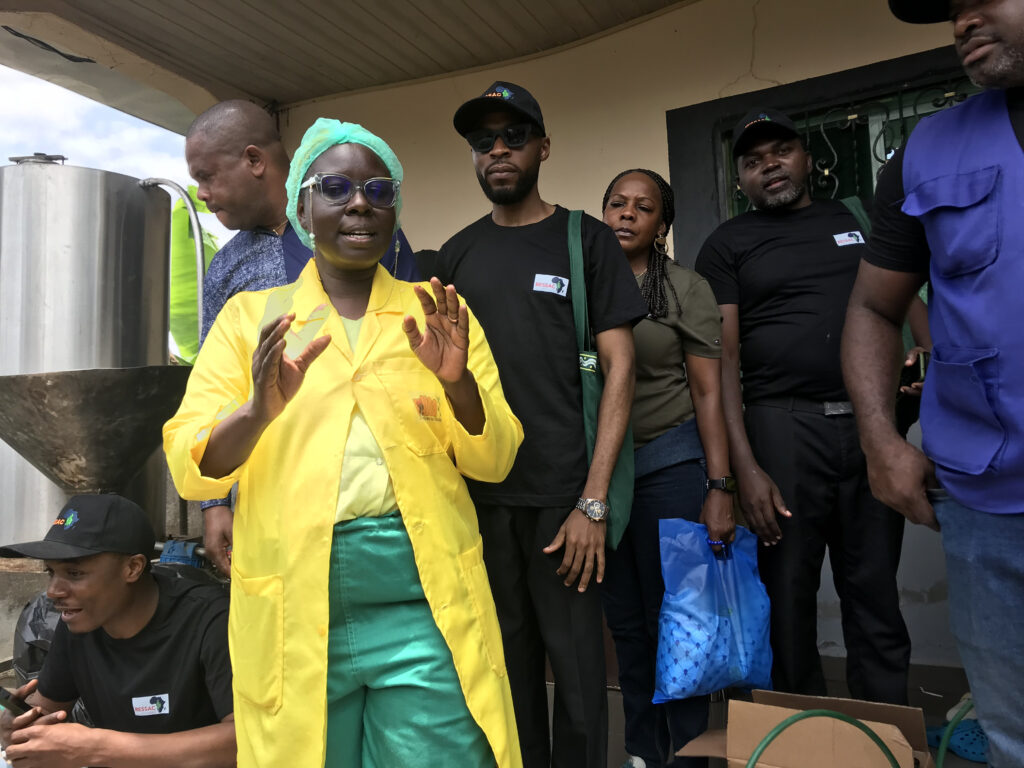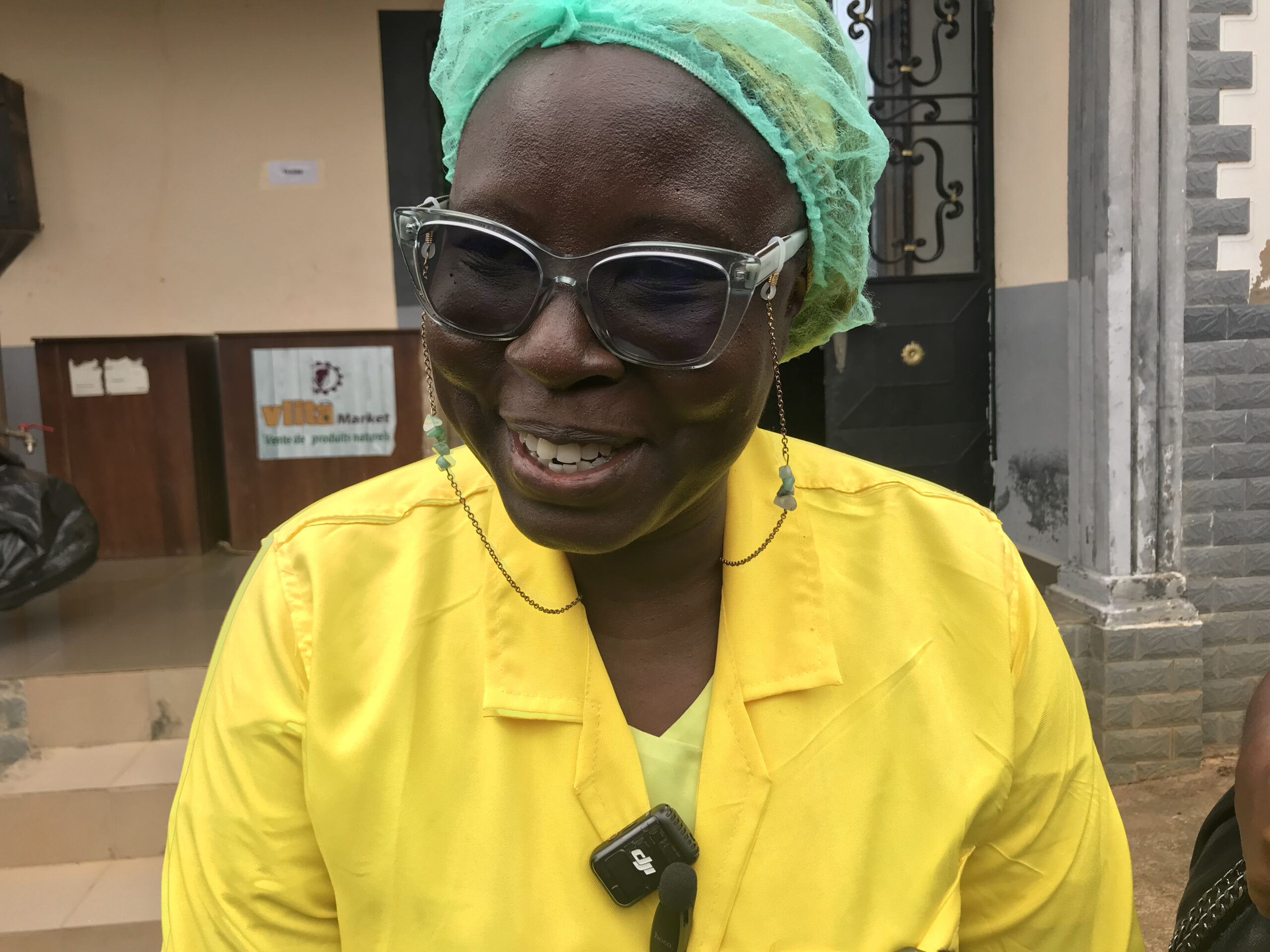By Leocadia Bongben
“I now check my sugar level once a year, thanks to the natural products I started consuming and transforming,” says Djamilatou Maliki, her eyes sparkling under her sunglasses, with a smile revealing white teeth as she narrated her diabetes story.
Her life changed when she was diagnosed with diabetes and forced to consume natural foods, adhering to rigorous regimens.
The businesswoman developed an interest in transforming non-timber forest products after finding it challenging to secure natural foods and oils, such as groundnut oil, while she was ill.
She gradually embraced another passion apart from teaching. Besides making oil from groundnuts, she started transforming bitter cola (Garcinia kola) and Balanite, also known as desert dates (Balanites Aegyptiaca).
Starting her business journey with a small handcrafted transformation unit, Djamilatou now operates a machine unit that employs seven people.
Product lines offered by Djamilatoun under her brand name, Vlita, include Balanite as a key product with Balanite oil, soap, biscuits, and body crème. Also, mordant (biting) is made from bitter cola (an aphrodisiac), baobab (Andonisia), and Njansang (Ricinodendron Heudelotti).
The Balanite is an evergreen shrub or tree that grows naturally in arid regions of the Middle East and Africa and is found in the northern part of Cameroon. It is valued for its delicious fruit, hardwood, and traditional medicinal applications for a range of ailments. Scientific studies have shown that Balanites are well-suited to dry conditions and include several advantageous components, including proteins, lipids, carbohydrates, and saponins.
This September morning, while welcoming environmental journalists from Central Africa to her cottage enterprise, Djamilatou showcased a variety of items, including the Balanite fruit and derivatives.

With assistance from groups like the Center for International Forestry Research/the International Center for Research in Agroforestry, CIFOR-ICRAF, she explains, cooperatives in North Cameroon gather the Balanite fruits from trees.
The first stage of the transformation begins after the fruits are harvested, the outer shell is removed, the fruit is dried, and transported to the transformation unit in the Nkolbison area of Yaoundé, Djamilatou’s production center.
Following the process, the entire fruit is used. “We use the shell to make soap, the fruit to make juice, and the seed for oil. Thereafter, the oil is used to make body cream,” Djamilatou explains.
Djamilatou had to complete several trainings to become an entrepreneur, including one offered by the CIFOR-ICRAF project, Research in Ecology and Social Sciences for Sustainable Forest Management in Central Africa (RESSAC). The Ministry of Small and Medium-sized Enterprises has rewarded her work with a gold award, among other accolades.
Pressure for wood and ageing threaten the Balanite trees
Trees in North Cameroon are essential for supporting biodiversity, providing communities with wood energy, and serving as windbreakers.
“Trees increase soil fertility, reduce land degradation, and provide access to essential resources such as food and fuel,” according to a CIFOR-ICRAF study.
Since many people rely on wood for cooking, it is projected that firewood is contributing to deforestation in the North and Far North regions. The Balanite tree is used for fuel; besides, the trees are ageing and should be replaced.
The Congo Basin is facing increasing biodiversity loss, deforestation, land degradation, and climate change, according to Dr Abdon Awono, RESSAC’s Capacity Building Coordinator.
This is supported by data from Global Forest Watch, indicating that Cameroon’s natural forest covered 34.5 million hectares (Mha) in 2020, or more than 74% of its total land area, and lost 173 kha of natural forest in 2024—equivalent to 109 Mt of CO2 emissions—depicting the effects of deforestation.
The North and the Far North regions lost an estimated 17 hectares of natural forest in 2024, including the balanite trees.
Efforts at Reforestation
Desertification and climate change manifest as extreme weather, heat, and floods, which are challenges to tree planting.
However, there are many reforestation projects in the North and Far North regions.
Through their “Innovation for Adaptation to Climate Change” (INNOVAC) project, CIFOR-ICRAF is one of the organisations prioritising tree planting in Cameroon’s North and Far North areas.
Djamilatou is aware that the balanite tree is threatened and could affect her business if she runs short of the fruits.
Together with the Maroua Council, Djamilatou and the cooperatives Wasakai and Kilal in Maroua and Kaele have nurtured and planted Balanite trees.
The demand for transformed products remains high, and the challenge for Djamilatou is to have a constant supply of balanites and produce on a large scale.

